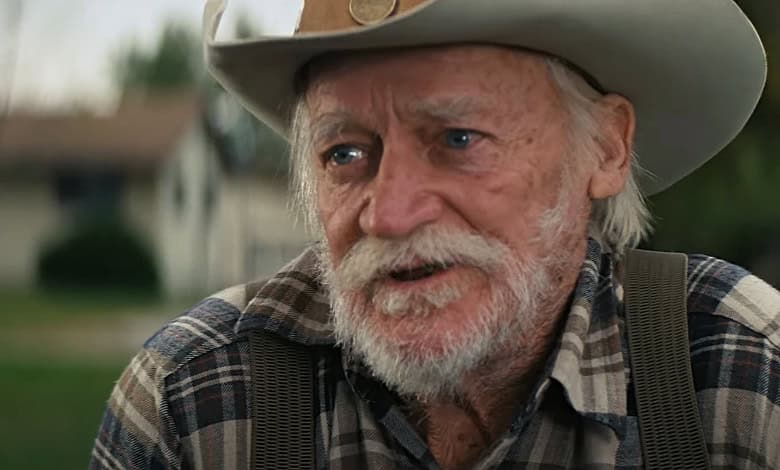David Lynch’s “The Straight Story” (1999) is his least expected work and one of his best.
Atypically straightforward but rich with expected visual poetry, Lynch directed this from a screenplay by Mary Sweeney and John Roach. The film tells the amazing story of Alvin Straight, an elderly Iowan who drove his tractor 300 miles to visit his ailing brother.
Richard Farnsworth stars as Alvin Straight, a WWII veteran who walks with two canes. His days are quiet, and his reputation is well-established in Laurens, Iowa. Recognizing his ailing health and how a rift between him and his brother (Harry Dean Stanton) has kept them apart for two long, Straight privately and stubbornly plans to make trip to see him.
Bearing in mind his age, Straight decided on a vehicle more fitting for him than a commercial vehicle. This is a true story, in which a 73-year-old, in 1994, drove his lawnmower 300 miles to Wisconsin.
Despite a wave of critical acclaim in the fall of ’99, it has become a little-known gem in Lynch’s body of work. Made in between “Lost Highway” (1997) and “Mulholland Dr.” (2001), this is even more out of character and startling to see in Lynch’s body of work than “Dune” (1984).
It opens with the once-in-a-lifetime sight of the Disney logo, followed by Lynch’s name as director.
The inciting incident is striking, filmed in almost the same way as the legendary opener for “Blue Velvet” (1986). In fact, the establishing shots of Alvin’s hometown evoke the title credits of “Twin Peaks.” For a film that seems so apart from Lynch’s usual output, the director has made the material his own and adapted it into his unique and recognizable cinematic universe.
RELATED: HOW LYNCH’S ‘MULHOLLAND DRIVE’ INVADED OUR DREAMS
Another Lynchian touch is the elevated sound design. When Alvin lights a cigar, the sound of the match hitting the box is akin to the eruption of the bonfire that begins Lynch’s “Wild At Heart” (1990). Lynch creates genuine suspense in the depiction of Alvin’s unpredictable journey.
Farnsworth maintains the familiar twinkle in his eye, but there is a touching honesty, even a raw quality to his performance, which is just about perfect. Farnsworth died at the age of 80 a year after the film was released.
Film historians may look at his work in “The Grey Fox” and “Anne of Green Gables” as more iconic, but what he achieves for Lynch is a true milestone and not the condescending wacky grandpa type of role most actors his age would find themselves in.
Lynch’s film isn’t cute, and neither is Farnsworth’s performance.
Sissy Spacek co-stars as Rose, Alvin’s daughter, who is defined as “a little bit slow.” Spacek is magnificent in this. Yes, I’ve seen “Carrie” and “Coal Miner’s Daughter,” but this is her best performance.
Bruce McGill has a great cameo, as does Stanton in a real beauty of a single scene, but the film belongs to Farnsworth and Spacek.
There’s poetry in the imagery, such as the moving bit where Rose watches a young boy pick up a ball off her lawn and walk off. We initially don’t know at first if it’s really happening, or a flashback or something else.
A later scene, between Alvin and a hitchhiker he meets over a bonfire, is so beautifully written, it could have been a perfect short film by itself. Likewise, the powerful, remarkable scene in which Alvin and another war veteran make a private confession to each other in an empty bar.
Despite the G-rating, this is not a children’s film. The Mouse House vote of confidence in this as a potential breakout hit was ill-advised, as the film never found much of an audience and the studio seemed clueless as to how they should market it.
Yes, as you have guessed, “The Straight Story” is slow and measured like its protagonist. Without Lynch, this could have been a disposable, corny Hallmark made-for-TV movie. In the hands of the creator of “Blue Velvet,” Lynch doesn’t merely make this fittingly eccentric, but seemingly lived in, real and oddly plausible.
John Roach and Mary Sweeney’s screenplay is never condescending and, as usual, Lynch’s vision is enhanced by Angelo Badalamenti’s tender score.
David Lynch behind the scenes of The Straight Story pic.twitter.com/XfOD0xxUwp
— Eyes On Cinema (@RealEOC) February 2, 2021
Despite the acclaim in ‘99, “The Straight Story” has become one of Lynch’s most under-the-radar achievements. Twenty-five years since its release, you rarely hear the film mentioned anymore.
It deserves rediscovery, not merely because of its place in Lynch’s body of work but because his engagement with the material matches his passion for the tortured and moving figures of his best films. Lynch cares about these characters – even at their most eccentric, they are vulnerable, real and moving.
“The Straight Story” remains a work of passion from one of our most consistently surprising filmmakers.





